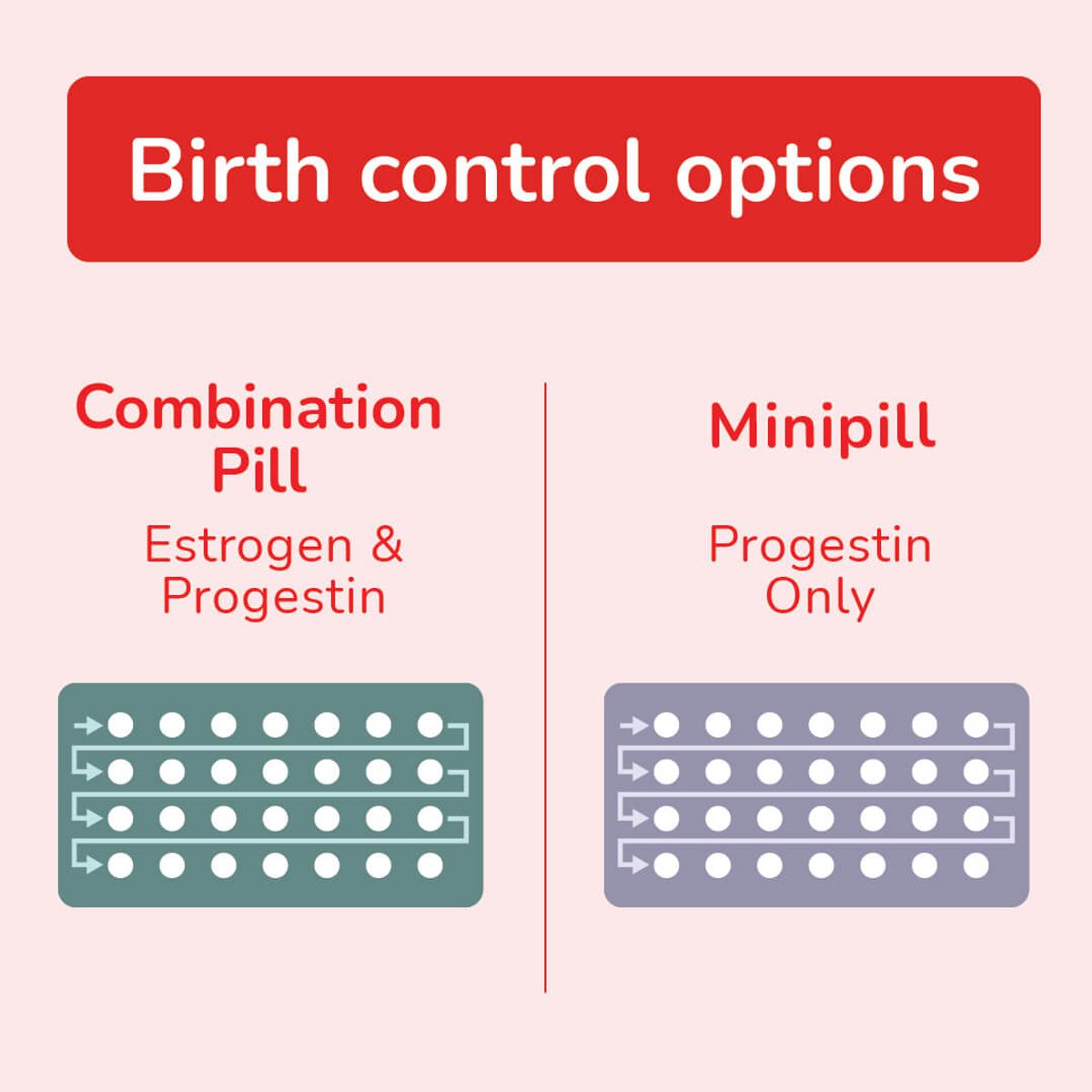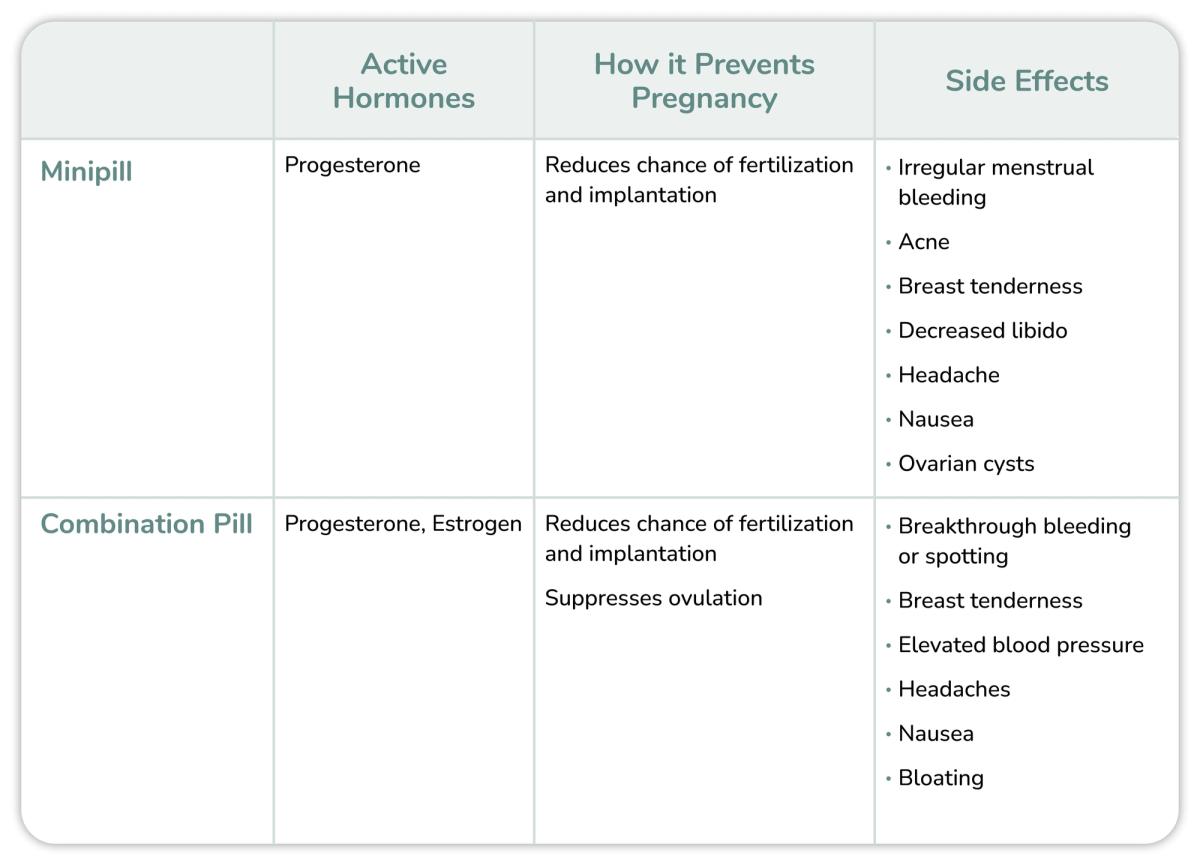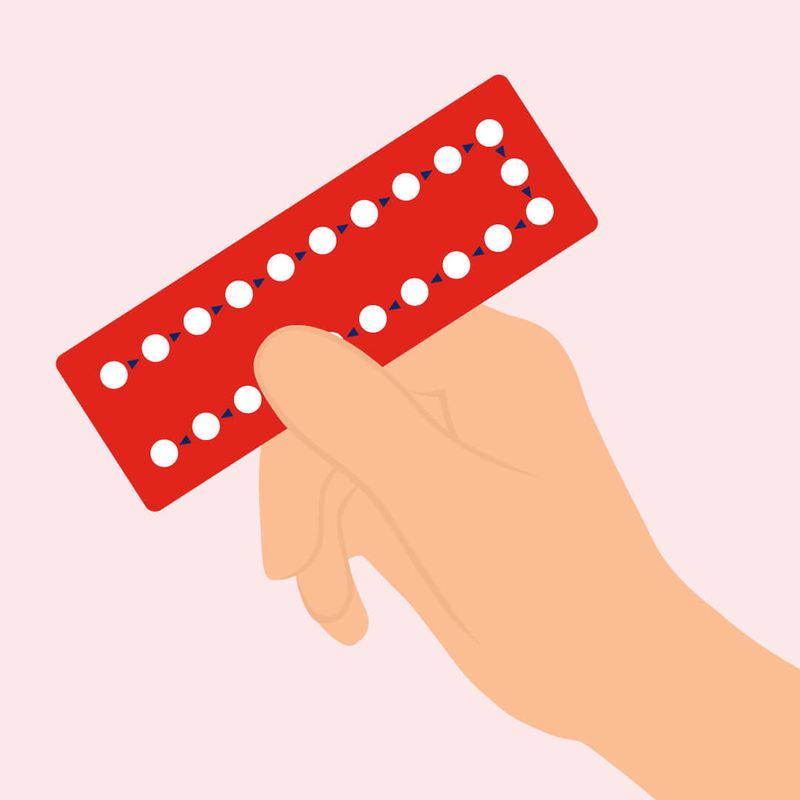Birth control pills are one of the most utilized and effective birth control methods. Which birth control pill is right for you? The minipill or the combination pill? The information below will provide insight to the different types of birth control that may be right for you.
Key Takeaways
Combination birth control pills contain both estrogen and progestin, and consistently stop ovulation while regulating cycles.
The minipill uses only progestin and mainly works by thickening cervical mucus, with ovulation blocked in some users.
The minipill suits people who are breastfeeding or who cannot take estrogen because of migraine with aura, high blood pressure or clot risk.
Combination pills can improve acne and menstrual symptoms but carry a small risk of blood clots and estrogen-related side effects such as nausea or breast tenderness.

What is the combination pill?
The combination birth control pill1 is often referred to as just “the pill.” It is the most common form of oral birth control available and is what most people think of when they hear the words birth control pill.
A combination pill contains artificial versions of the female hormones estrogen and progesterone. Depending on the type of pill, the hormones are administered in different levels or patterns.
How the combination pill works:
The combination pill works in three ways to prevent pregnancy:
The pill prevents ovulation each month so there is no egg released into the uterus.
The combination pill thickens the mucus in the neck of the uterus. This makes it difficult for the sperm to penetrate the womb.
The pill thins the lining of the uterus to reduce the chance that a fertilized egg can implant and start a pregnancy.
Types of combination pill
The combination pill comes in a few different forms. Different brands have varying percentages of hormones that can be customized depending on the person’s needs. The pills can be classified in two major groups: monophasic and triphasic.
Monophasic combination pill
The monophasic combination pill is the most commonly prescribed type of birth control2. The mono in monophasic stands for one and represents the one steady level of hormones in the pill. In a 28-day cycle, for example, a monophasic pill will administer a consistent level of hormones to prevent the hormonal shifts of the menstrual cycle for 3 weeks with a seven dose phase of placebos to allow for menstruation.
Common brands of monophasic combination pill3
Ortho Cyclen®
Yasmin®
Yaz®
Lybrel®
Triphasic combination pill
A triphasic combination birth control pill4 distributes hormones in three phases. Usually this is a 21-day period with each level of hormones lasting for seven pills and then seven placebo pills that allow for menstruation.
Common brands of triphasic combination pill5
Ortho Tri-Cyclen®
Aranelle®
Triphasil®
Cyclessa®
While every woman is different in her reactions to hormonal birth control, there are some reasons why a person would choose a monophasic or triphasic combination pill over the other. Monophasic birth control’s consistent supply of hormones across the cycle can result in less side effects like headaches, bloating, and breast tenderness. A triphasic pill more closely mimics natural hormone fluctuations and can minimize irregular bleeding6.
What is the minipill?
Minipill7 is a form of oral birth control that contains only progesterone. It also has less progesterone than the combination pills.
A low-dose progesterone pill can be beneficial for a variety of reasons. A healthcare provider may recommend the minipill for the following reasons:
You are breastfeeding. Estrogen has the potential to possibly reduce lactation for some women. Although the suppression of lactation from estrogen has mostly been proven unlikely, many health professionals still recommend a minipill for breastfeeding mothers.
You have a particular health problem. The combination pill puts users at a higher risk for blood clots, especially in the legs or lungs. If you have a history of blood clots, your doctor may recommend being on a minipill for a lower dose of hormones.
You wish to reduce side effects of estrogen. For many users, estrogen can have unfortunate side effects like bloating, breast tenderness, cramps, vaginal bleeding, headaches, nausea, and indigestion. Taking the minipill, with only progesterone, can reduce or eliminate many of the side effects of the combination pill.
How the minipill works:
There three ways the minipill works to prevent pregnancy:
The minipill makes it difficult for the sperm to penetrate the womb by thickening the mucus in the neck of the uterus.
The minipill greatly reduces chances of implantation of a fertilized egg by thinning the lining of the uterus.
The minipill can prevent ovulation but is not as consistent as the combination pill.
Common brands of the minipill8
The minipill contains the drug norethindrone, a form of progestin. It is widely available as a generic as well as these common brands:
Camila®
Errin®
Heather®
Jolivette®
Ortho Micronor®

Start an assessment for birth control today.
We’ve made it even easier to access the birth control that’s right for you with convenient online consultations and a variety of birth control pills for different needs. Our U.S. licensed medical providers will discuss what might be most effective for you.
Get started for freeWhat are common side effects?
Birth control pills supplement hormones and have been known to cause some side effects in users. Many of the side effects of the minipill and combination pill are similar, with a few exceptions.
Common side effects of the combination pill9
Some of the side effects reported from use of the combination pill for birth control:
Breakthrough bleeding or spotting
Breast tenderness
Elevated blood pressure
Headaches
Nausea
Bloating
Common side effects of the minipill
The following are common side effects from use of the minipill10:
Acne
Breast tenderness
Decreased libido
Headache
Nausea
Ovarian cysts
Minipill vs Combination Pill: How do they compare?
Below is a side-by-side chart to compare the active hormones, functions, and side effects of the minipill vs. the combination pill.

Can I get birth control pills online?
Birth control pills do require a prescription from a registered medical professional. However, you can get birth control pills online from a licensed telehealth provider.
How RedBox Rx can help

RedBox Rx makes receiving a prescription for birth control easy and affordable.
Benefits of RedBox Rx include:
Transparent, affordable, flat rates for medications starting at $10/month.
FREE consultations with a U.S. licensed medical professional.
No insurance required. FSA and HSA eligible.
No office wait times or scheduling issues typical with physical medical practices.
FREE shipping directly to you. Quarterly, bi-annual and annual subscriptions available.
Get started now with a free online consult for birth control.


